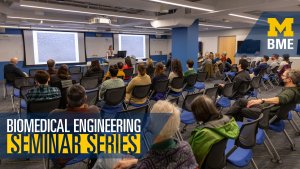Presented By: Biomedical Engineering
Dynamical network models of the epileptic brain to improve surgical outcomes
BME 500 Seminar - Rachel June Smith, Ph.D.

Abstract:
Medically-refractory epilepsy (MRE) is a devastating neurological disease that is defined by recurrent and unprovoked seizures that are insufficiently controlled by anti-epileptic medication. If the seizures are originating from a specific region of the brain, surgical removal or stimulation of the epileptogenic region can be an effective therapy for these patients. The accurate localization of the seizure onset zone (SOZ) is critical for surgical success, but localizing the SOZ often requires implantation of intracranial EEG electrodes and continuous monitoring in the hospital for days to weeks so that seizures are recorded. Despite the longevity and invasiveness of this procedure, surgical success rates can be as low as 34%. In this talk, I will describe a study that aims to improve seizure onset localization and expedite the intracranial monitoring process by employing dynamical network models that investigate the patient’s epileptogenic network with recordings obtained during single-pulse electrical stimulation (SPES). We hypothesize that a dynamical quantification of the connectivity networks derived from the evoked responses induced by SPES could also be used to accurately localize the SOZ and guide clinicians in eliciting native seizures with electrical stimulation. I will give an overview of these dynamical network techniques and describe their potential impact in the clinical treatment of medically-refractory epilepsy.
Bio:
Rachel June Smith is a postdoctoral fellow in the Biomedical Engineering Department and Institute for Computational Medicine at Johns Hopkins University. She received her B.S. in Biomedical Engineering from the University of Tennessee, Knoxville, in 2014 and her M.S. and Ph.D. from UC Irvine in Biomedical Engineering in 2019. Her doctoral work focused on the development of computational metrics in scalp EEG data that reflected disease burden and predicted response to treatment in patients with infantile spasms. Currently, Rachel uses dynamical systems and control theory techniques to localize the onset of seizures in the epileptic brain. Rachel has been recently recognized for her work by the American Epilepsy Society where she won a 2020 Young Investigator Award and was named an AES Fellow.
Zoom Link: https://umich.zoom.us/j/96508834308
Organized by:
Dr. Brendon Baker,
Assistant Professor, Biomedical Engineering
Dr. David Nordsletten,
Associate Professor, Department of Biomedical Engineering and Cardiac Surgery
Medically-refractory epilepsy (MRE) is a devastating neurological disease that is defined by recurrent and unprovoked seizures that are insufficiently controlled by anti-epileptic medication. If the seizures are originating from a specific region of the brain, surgical removal or stimulation of the epileptogenic region can be an effective therapy for these patients. The accurate localization of the seizure onset zone (SOZ) is critical for surgical success, but localizing the SOZ often requires implantation of intracranial EEG electrodes and continuous monitoring in the hospital for days to weeks so that seizures are recorded. Despite the longevity and invasiveness of this procedure, surgical success rates can be as low as 34%. In this talk, I will describe a study that aims to improve seizure onset localization and expedite the intracranial monitoring process by employing dynamical network models that investigate the patient’s epileptogenic network with recordings obtained during single-pulse electrical stimulation (SPES). We hypothesize that a dynamical quantification of the connectivity networks derived from the evoked responses induced by SPES could also be used to accurately localize the SOZ and guide clinicians in eliciting native seizures with electrical stimulation. I will give an overview of these dynamical network techniques and describe their potential impact in the clinical treatment of medically-refractory epilepsy.
Bio:
Rachel June Smith is a postdoctoral fellow in the Biomedical Engineering Department and Institute for Computational Medicine at Johns Hopkins University. She received her B.S. in Biomedical Engineering from the University of Tennessee, Knoxville, in 2014 and her M.S. and Ph.D. from UC Irvine in Biomedical Engineering in 2019. Her doctoral work focused on the development of computational metrics in scalp EEG data that reflected disease burden and predicted response to treatment in patients with infantile spasms. Currently, Rachel uses dynamical systems and control theory techniques to localize the onset of seizures in the epileptic brain. Rachel has been recently recognized for her work by the American Epilepsy Society where she won a 2020 Young Investigator Award and was named an AES Fellow.
Zoom Link: https://umich.zoom.us/j/96508834308
Organized by:
Dr. Brendon Baker,
Assistant Professor, Biomedical Engineering
Dr. David Nordsletten,
Associate Professor, Department of Biomedical Engineering and Cardiac Surgery